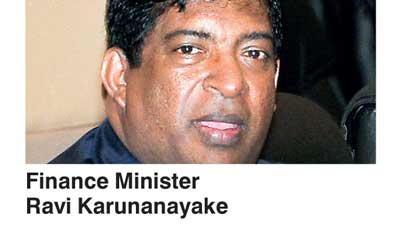Monday Feb 23, 2026
Monday Feb 23, 2026
Wednesday, 14 December 2016 00:01 - - {{hitsCtrl.values.hits}}
 By Chathuri Dissanayake
By Chathuri Dissanayake
Finance Minister Ravi Karunanayake yesterday brimmed with optimism over the economy after receiving a two-thirds majority for the Budget 2017 vote, which he insisted sets the stage for a stable economy that will boost investor confidence and pave the way for more Public Private Partnerships (PPPs) in the coming year.
All required legislation to implement Budget proposals will be set in place by February next year, the Minister told Daily FT.
“The majority of the proposals have to be implemented from 1 January, which is pronounced by the minister and gazetted and which can be corrected by 31 March. Some will come into effect by April, 2017, so these legislations will have time for implementation. But all legal measures will come by February,” the Minister assured.
Unlike the previous year’s Budget, which underwent a series of revisions after its presentation, the Minister said no proposal had been revised or was likely to go through any revisions in the future. “Nothing has been revised. Nothing in the Budget proposals have been disputed. This was commonly brought in by the UNP and SLFP Government in agreement. There was no need for revisions,” he said.
Accordingly, the much debated Rs. 25,000 traffic fine hike for seven offences will remain, while the minimum traffic fine will be revised after discussions with relevant authorities, despite trade union action taken against the move by private bus owners. Other proposed revisions to proposals, including a 2.5% hike in a telecom levy and income tax changes, have not been adopted, he said.
The Minister also confirmed that the Tea CESS fund would be channelled to the Consolidated Fund despite strong opposition levelled against the move by the industry.
“When needed, funds will be sent to the ministry,” Karunanayake said. Further restructuring of regional plantation companies to limit land held by loss-making companies to 5,000 acres will also get priority during the coming months, the Minister revealed.
“Discussions with plantation companies will start and the process will be launched soon. It is not fair for them to be taking Government subsidies and carrying on the mismanagement as it has been happening till now,” Karunanayake said.
Moving forward, the Government will prioritise negotiations for joint ventures in SriLankan Airlines, the Mattala Airport and Norochcholai among other loss-making public institutions in the country, the Minister claimed.
With the boost received from gaining a two-thirds voting majority in Parliament, Karunanayake spoke confidently about the country’s economy.
“At a time when the dollar is turbulent, we are steering clear and guiding through some of the most difficult circumstances. But we are well in control of the situation as it is,” he said.
Karunanayake also hit back at speculation that the Government would have a flexible exchange rate, claiming that the Government was in full control of the situation and had no plans to devalue the currency.
“Devaluation is not the panacea of all ills,” he claimed.
Refuting suggestions that the rupee devaluation should be carried out according to the recommendations of the International Monetary Fund, he said that the Government would only take what was suitable from the recommendations.
“It is for them to say what we should look at and we will decide on what is to be taken on board. The choice is ours,” the Minister explained.